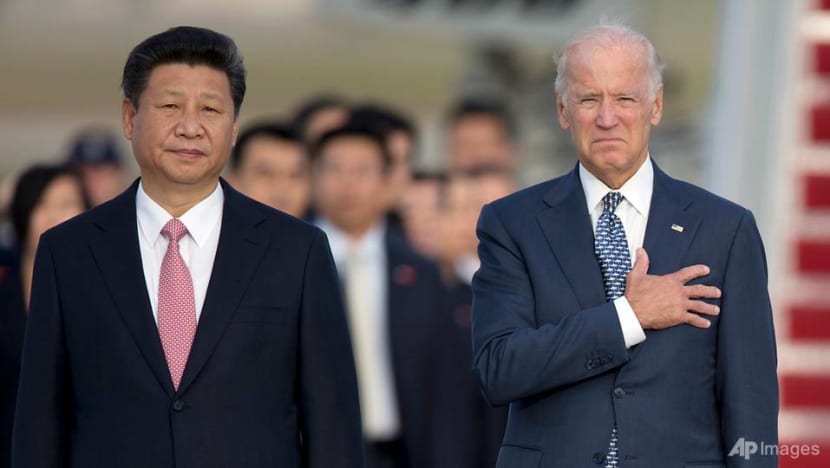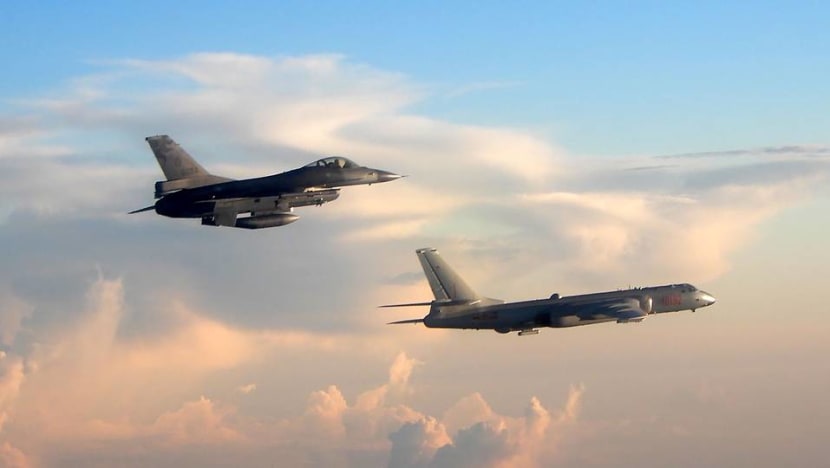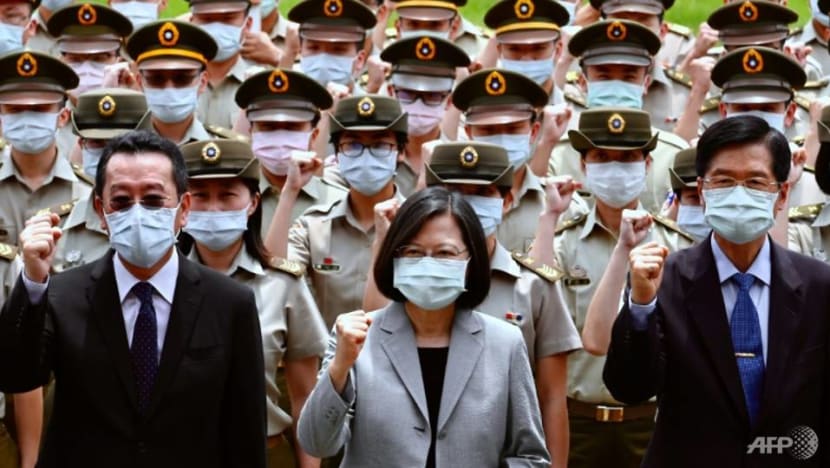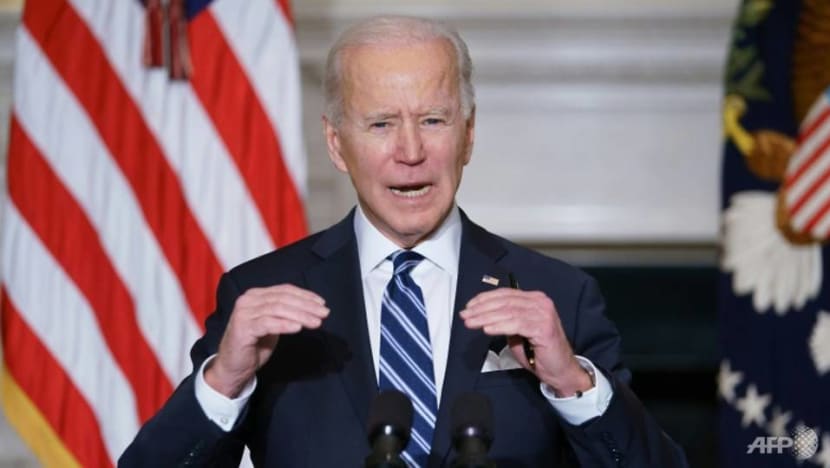commentary Commentary
Commentary: Taiwan is becoming the biggest test in US-China relations
US President Joe Biden must demonstrate resolve yet bolster communication channels with China and manage the signature of interactions with Taiwanese officials, says Ted Gover.

In this Sep 24, 2015 file photo, Chinese President Xi Jinping, then Vice-President Joe Biden, stand for the US national anthem during an arrival ceremony in Andrews Air Force Base. (Photo: AP/Carolyn Kaster, File)
CLAREMONT, California: Recent weeks have seen a rise in tensions in East Asia’s waterways with a Chinese aircraft carrier group and US warships sailing through the Taiwan Strait.
Concurrently, in the name of safeguarding China’s sovereignty and maritime rights, Beijing passed a law empowering the China Coast Guard to board, inspect and fire on foreign vessels in waters claimed by China.
The new law also empowers them to demolish other countries’ structures built on Chinese-claimed reefs and create exclusion zones to prevent unwanted vessels from entering “as needed”.
READ: Taiwan scrambles air force again after Chinese exercises in South China Sea
READ: Four Taiwan ex-intelligence officers charged with spying for China
CHINA TESTS THE US
These developments are an initial test for US President Joe Biden from Chinese President Xi Jinping.
Beijing is wasting no time with checking the extent to which it can pursue its expansive maritime claims and ratchet up the pressure on Taiwan before it receives pushback from the new White House.
As a sign of China’s anger over increased US political contacts with Taiwan and recent arms sales to the island, December and January saw multiple Chinese fighter jets, anti-submarine aircraft and bombers flying into Taiwan’s air defence zone.
READ: Commentary: Xi Jinping’s not-so-bad, actually-quite-good year in 2020
This comes on top of Beijing intruding into Taiwan’s air defence identification zone on multiple occasions last June, sending Su-30, J-10 and J-11 fighters in addition to Y-8 surveillance planes and H-6 bombers, allowing them to test Taiwan’s air defences.
According to Beijing, the military exercises in January were a "solemn warning to external forces" and necessary to "safeguard national sovereignty and territorial integrity" against foreign interference.
INCREASED US-CHINA FRICTION
For its part, the Biden administration has shown support for maintaining the previous Donald Trump administration’s elevation of unofficial ties with Taiwan. Taipei’s representative to the US, Hsiao Bi-khim, attended Biden’s inauguration on Jan 20, the first such attendance since 1979.

Shortly after that same week, the guided-missile destroyer USS John McCain sailed through the Taiwan Strait after steaming past a disputed island chain in the South China Sea as a demonstration of Washington’s “commitment to a free and open Indo-Pacific” and determination to “fly, sail and operate anywhere international law allows", according to a statement by the US Navy’s Seventh Fleet.
Against this backdrop of increased friction involving Taiwan, China’s top diplomat Yang Jiechi stressed to US Secretary of State Antony Blinken on Feb 6 that this was a key moment in US-China ties and urged for the US to uphold the spirit of non-confrontation, while emphasising that Taiwan remains the most important and sensitive problem in the US-China relationship.
How should President Biden respond to these initial challenges from China involving Taiwan?
READ: Commentary: US-China relations - age of engagement comes to a close
DEMONSTRATING RESOLVE WITH CONTINUED EXERCISE OF PRESENCE
For starters, military drills like last week’s US carrier groups USS Theodore Roosevelt and USS Nimitz in the South China Sea are important for demonstrating Washington’s resolve and commitment to allies and partners in the region amid China’s aggressive territorial claims.
The two strike groups, consisting of 120 aircraft in addition to destroyers and guided-missile cruisers, are meant to demonstrate American capabilities towards promoting a free and open Indo-Pacific.
Frequent US and allied freedom of navigation operations (FONOPs) and naval aircraft overflights in waters claimed by Beijing are also needed to send a message that aggressive action will not be tolerated.
READ: Commentary: The sands in the South China Sea dispute may be shifting
BOLSTERING TAIWAN’S DEFENCE CAPABILITIES
Beyond actions by the US Seventh Fleet, more is needed to upgrade Taiwan’s own defences to communicate to China the Biden administration’s commitment to Taiwan.
Along these lines, the Taiwan Relations Act of 1979 allows the US to provide Taiwan arms “in such quantity as may be necessary to enable Taiwan to maintain a sufficient self-defense capability”.
As Bradley Bowman and Andrew Stricker of the Foundation For Defense of Democracies have reported, the Trump administration approved one of the largest military aid packages to Taiwan ever - in excess of US$17 billion - that involved the sale of 66 F-16 fighters, stinger missiles, UPAC-3 missiles, MK 48 torpedoes and M1A2T tanks.
Bowman and Stricker rightly argue that the US should continue with its policy of selling arms to Taiwan, in meeting its obligations under the Taiwan Relations Act.

Washington should also provide Taipei with strong defensive capabilities ranging from anti-ship missiles, cruise missiles, naval defensive mines and short-range air defence systems.
Furthermore, Taiwan would benefit from training assistance on its upgraded defence capabilities.
READ: Commentary: Parts of Asia will miss Donald Trump’s tough China policy
MAINTAINING STRATEGIC AMBIGUITY
Amid this volatile time, Biden can help deter Chinese aggression by maintaining the US doctrine of strategic ambiguity.
As with past administrations, Mr Biden can reserve the right to use force to defend Taiwan while not forecasting the circumstances under which Washington would employ military capabilities in a future conflict, thereby altering Beijing’s calculus and possibly constraining its actions.
This will be consistent with US law under the Taiwan Relations Act which states that “any effort to determine the future of Taiwan by other than peaceful means” would represent “a threat to the peace and security of the Western Pacific area” and be “of grave concern to the United States”.
READ: Commentary: It’s engagement not containment of China that Joe Biden will focus on
In addition, Washington and Beijing ought to take a page out of the US-USSR Cold War playbook and make efforts to reduce the risk of escalation over Taiwan and the broader region.
Initially, this can include periodic meetings between US and Chinese armed forces and the establishment of military hotlines, among other steps.
TAKING A CALIBRATED APPROACH
The Biden administration should refrain from getting drawn into Taiwanese claims of independence and avoid provoking Chinese sensitivities over Taiwan by employing a lower profile approach in US-Taiwan ties. Meetings between US and Taiwan officials ought to be held with less fanfare.

While Washington will continue to confront Beijing on a number of ongoing areas of concern - including disputed claims in the East and South China Seas, China's treatment of Hong Kong, the Uighurs, its Christian population and more - fomenting a loss of face for Beijing over highly publicised US cabinet official trips to Taiwan is unproductive for the increasingly complex US-China relationship.
The widely covered Taipei visit by former US Health and Human Services Secretary Alex Azar last year unnecessarily heightened tensions during a tumultuous time for Trump and Xi. Unfortunately, this mistake on the part of Washington further complicates the Taiwan issue which has become the biggest challenge thus far for Mr Biden's China policy.
Additionally, non-military approaches can help degrade China’s ongoing efforts to isolate Taiwan from the world community. The Biden administration should step up cultural, educational, technological, scientific and economic ties with Taiwan.
Washington should also sustain its support towards Taiwan’s long-sought observership in global institutions like the World Health Organization.
Lastly, the Biden administration should periodically re-emphasise its commitment to help Taiwan maintain adequate self-defence capabilities, its support for a peaceful resolution of cross-strait issues and its focus on deepening ties with Taiwan.
READ: Commentary: US paid dearly for absence in Pacific trade deal
Mr Biden’s team will also need to urge Xi Jinping to engage peacefully with Taiwan’s elected leaders and stop its pressure operations against the island nation.
A good start would be to encourage future dialogues between Beijing and Taipei. There is precedent for this, the latest being President Xi’s 2015 landmark meeting with then Taiwanese President Ma Ying-jeou in Singapore where both sides committed to reducing animosity and maintaining peaceful cross-strait ties.
Thus far, Mr Biden has signaled his administration will adopt much of Mr Trump’s approach to Taiwan.
This elevating of US relations with Taiwan, if executed with the right balance of resolve, tact and mutual respect towards Beijing, can be an effective approach for maintaining peace in the Taiwan Strait.
Ted Gover, PhD, is Director of the Tribal Administration Program at Claremont Graduate University.












